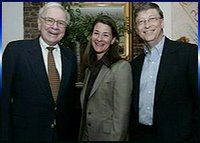A Lesson in How to Give
Another thotful article from daddy's uncle. Dad has plenty of new-found respect for the Gates Foundation and Warren Buffet but he's still busy looking for his first million dollars. Can't afford to give anything away at this time. :-)
The sums of money were almost beyond comprehension. What does it mean when the world’s second richest man gives over US$30 billion that is HK$234,000,000,000 if you want to count the zeros) to the world’s richest man, or at least to his charity?
Both Bill Gates (right and wife Melinda in the centre) and Warren Buffett (left) have much in common. They have an amazing ability to accumulate money and they have shown equal sagacity in giving it away. They are both Americans. They both say that spending their wealth sensibly is just as difficult as making it, or as Buffett says “Giving money away is a much tougher problem than amassing it”. They both support inheritance taxes. They both disapprove of being too generous to their children.

In today’s world there are more and more billionaires who have got everything — property, casinos, horses, women, yachts, entire football teams, jet planes. Entrepreneurs do not like to see their wealth lying idle in the bank. But their huge fortunes are notoriously hard to dispose of.
What makes the examples of Bill Gates and Warren Buffett so special is that they both believe that a meritocratic society is incompatible with inherited wealth. As Mr Buffett said when he gave away his US$30 billion : “I will leave my children enough money so that they can do what they want but not so much that they can do nothing”. Both Gates and Buffett have campaigned strongly against President Bush’s policy goal to abolish the U.S. tax on inherited wealth.
And it is not just Gates and Buffett who are speaking like this. The founder of CNN Ted Turner, the investor George Soros, and Sandy Weill of Citigroup all say the wisest destination for huge wealth is philanthropy. Inherited wealth is harmful to society, they say. Give to society, not to your heirs, is their message. These men are also scathing about governments’ ability as donors of aid. Buffett says only a fool leaves his money to a government.
Is something new stirring in the hearts of the super rich? Will the 21st century be the era when the mega-rich develop an equally large charitable conscience? Are we entering an age of unprecedented philanthropy?
I also admired Warren Buffett’s words at the New York ceremony when he signed letters distributing his wealth. He said that passing wealth down the generations would create the sort of aristocratic society that the founding fathers of the U.S. sought to prevent. He also labelled capitalism as an inefficient distribution mechanism. “When your children have all the advantages, like the best education, it is neither right nor rational to flood them with money”, he said. Even more revealingly, he believes that private inherited wealth and government welfare payments deliver the same result — a cycle of dependency or “a lifetime supply of food stamps” as he puts it.
Finally, Mr Buffett repeatedly emphasised the role of luck in getting rich. He calls himself “a member of the lucky sperm club” by which he means he was lucky enough to be born at the right time, in the right place, so that he could reward his absurd ability for asset allocation. Nor does he care about attaching his name to his wealth; he is not interested in perpetuating his name with a “Buffett Foundation”.
Finally, says Buffett, rich people should look at his gifts as models for what to do with their wealth. I believe Buffett teaches us all something very valuable: how to be wise with money while we are still alive.
Warren Buffett is famous for his humour. As he handed Bill Gates the letter setting out the gift of his $30 billion he quipped “Be careful you don’t lose that letter!”




No comments:
Post a Comment